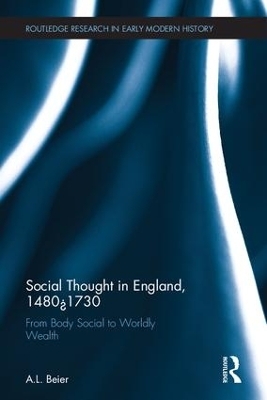
Social Thought in England, 1480-1730
Routledge (Verlag)
978-1-138-95686-5 (ISBN)
Authorities ranging from philosophers to politicians nowadays question the existence of concepts of society, whether in the present or the past. This book argues that social concepts most definitely existed in late medieval and early modern England, laying the foundations for modern models of society. The book analyzes social paradigms and how they changed in the period. A pervasive medieval model was the "body social," which imagined a society of three estates – the clergy, the nobility, and the commonalty – conjoined by interdependent functions, arranged in static hierarchies based upon birth, and rejecting wealth and championing poverty. Another model the book describes as "social humanist," that fundamentally questioned the body social, advancing merit over birth, mobility over stasis, and wealth over poverty. The theory of the body social was vigorously articulated between the 1480s and the 1550s. Parts of the old metaphor actually survived beyond 1550, but alternative models of social humanist thought challenged the body concept in the period, advancing a novel paradigm of merit, mobility, and wealth. The book’s methodology focuses on the intellectual context of a variety of contemporary texts.
A.L. Beier is Professor Emeritus at Illinois State University.
Part I: The Body Social, 1480–1550 1. The Body Imagined 2. Contexts and Conflicts 3. The Body Examined: Ancient, Medieval, Modern 4. Different Metaphor, Similar Message: Edmund Dudley’s "Tree of Commonwealth," 1509-1510 5. The Body Historicized: Clement Armstrong, 1529-1536 6. Defending the Body: "Commonwealth-Men," c. 1520–c. 1553 Part II: Social Humanist Challenges to the Body Social, 1516-1549 7. Moving Away from the Body: An Overview 8. Poverty, Wealth, and Labor: New Theory, New Practices 9. A Radical Re-Ordering: Thomas More’s Utopia, 1516 10. Social Humanist Thought Re-Defines the Social, c. 1523/5-1536. 11. Rethinking the Three Estates: Thomas Starkey’s "Dialogue Between Lupset and Pole," 1529-1532 12. Virtue Meets Profit: The Brave New World of Sir Thomas Smith, 1549 Part III: Society as Property, 1550-1697 13. Re-Drawing the Social Picture, 1550-1600 14. Property, Patriarchy, and the Agrarian Problem, 1593-1656 15. The Power of Property Perceived, 1576-1730 16. Property Assailed and Defended: Grandees, Levellers, and Diggers: 1647-1649 17. Conclusions: The Past Makes the Future
| Reihe/Serie | Routledge Research in Early Modern History |
|---|---|
| Zusatzinfo | 5 Tables, black and white; 7 Halftones, black and white; 7 Illustrations, black and white |
| Verlagsort | London |
| Sprache | englisch |
| Maße | 152 x 229 mm |
| Gewicht | 771 g |
| Themenwelt | Geschichte ► Allgemeine Geschichte ► Neuzeit (bis 1918) |
| Geisteswissenschaften ► Geschichte ► Regional- / Ländergeschichte | |
| Geschichte ► Teilgebiete der Geschichte ► Kulturgeschichte | |
| Geschichte ► Teilgebiete der Geschichte ► Sozialgeschichte | |
| Sozialwissenschaften | |
| ISBN-10 | 1-138-95686-4 / 1138956864 |
| ISBN-13 | 978-1-138-95686-5 / 9781138956865 |
| Zustand | Neuware |
| Haben Sie eine Frage zum Produkt? |
aus dem Bereich


